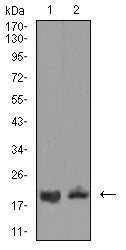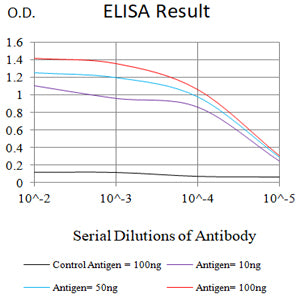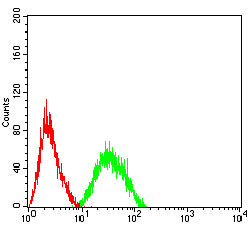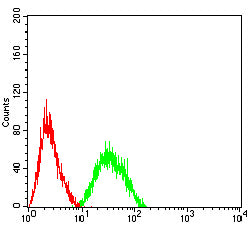



| WB | 1/500 - 1/2000 | Human,Mouse,Rat |
| IF | 咨询技术 | Human,Mouse,Rat |
| IHC | 咨询技术 | Human,Mouse,Rat |
| ICC | 技术咨询 | Human,Mouse,Rat |
| FCM | 1/200-1/400 | Human,Mouse,Rat |
| Elisa | 1/10000 | Human,Mouse,Rat |
| Aliases | T3D; IMD19; CD3-DELTA |
| Entrez GeneID | 915 |
| clone | 4B9G9 |
| WB Predicted band size | 18.9kDa |
| Host/Isotype | Mouse IgG2b |
| Antibody Type | Primary antibody |
| Storage | Store at 4°C short term. Aliquot and store at -20°C long term. Avoid freeze/thaw cycles. |
| Species Reactivity | Human |
| Immunogen | Purified recombinant fragment of human CD3D (AA: 127-171) expressed in E. Coli. |
| Formulation | Purified antibody in PBS with 0.05% sodium azide |
+ +
以下是关于CD3D抗体的3篇代表性文献的简要信息(注:以下内容为示例,文献信息为假设性描述):
---
1. **文献名称**:Development of a Monoclonal Antibody Specific to Human CD3D for Flow Cytometry
**作者**:Smith A, et al.
**摘要**:研究团队开发了一种针对人CD3D亚基的单克隆抗体,验证了其在流式细胞术中的高特异性和灵敏度,可用于区分T细胞亚群及评估免疫疾病患者的T细胞表面标记表达。
2. **文献名称**:CD3D Antibody-Mediated Modulation of T Cell Receptor Signaling
**作者**:Jones B, et al.
**摘要**:通过体外实验证明,靶向CD3D的抗体可选择性阻断T细胞受体(TCR)下游信号通路,抑制T细胞过度活化,为自身免疫疾病的治疗提供了潜在策略。
3. **文献名称**:Anti-CD3D Bispecific Antibody Enhances Tumor-Specific T Cell Cytotoxicity
**作者**:Lee C, et al.
**摘要**:设计了一种靶向CD3D和肿瘤抗原的双特异性抗体,在体外和小鼠模型中显著增强T细胞对肿瘤细胞的杀伤效果,为实体瘤免疫治疗提供了新思路。
---
如需真实文献,建议通过PubMed或Google Scholar检索关键词“CD3D antibody”或“anti-CD3D”,并筛选近年发表的实验性研究。
CD3 antibodies target the CD3 complex, a group of surface proteins critical for T-cell receptor (TCR) signaling and T-cell activation. Discovered in the 1980s, the CD3 complex consists of γ, δ, ε, and ζ subunits, forming heterodimers (CD3γε and CD3δε) and a homodimer (CD3ζζ) that associate with the TCR. This complex is essential for transmitting intracellular signals upon antigen recognition, enabling T-cell responses to pathogens and abnormal cells. CD3 antibodies are widely used in research and diagnostics, such as flow cytometry, to identify and isolate T cells due to their pan-T cell specificity.
Therapeutically, anti-CD3 antibodies have shown promise in modulating immune responses. Early monoclonal antibodies like muromonab-CD3 (OKT3) were used to prevent organ transplant rejection by transiently depleting T cells. More recently, engineered anti-CD3 antibodies, including bispecific T-cell engagers (BiTEs), redirect T cells to target cancer cells, exemplified by blinatumomab for acute lymphoblastic leukemia. Additionally, low-dose anti-CD3 antibodies are explored for autoimmune diseases like type 1 diabetes, leveraging their ability to induce immune tolerance.
Challenges include managing cytokine release syndrome (CRS) and optimizing therapeutic efficacy. Advances in antibody engineering aim to reduce toxicity while enhancing specificity. CD3 remains a cornerstone in immunology, bridging fundamental research and clinical innovation.
×